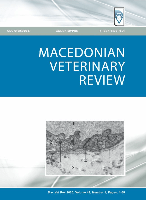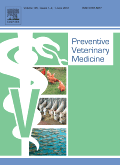
Macedonian Veterinary Review
Scope & Guideline
Enhancing animal welfare through shared knowledge.
Introduction
Aims and Scopes
- Veterinary Clinical Research:
The journal focuses on clinical studies involving companion and farm animals, emphasizing diagnostic techniques, treatment protocols, and surgical interventions. - Infectious Diseases and Epidemiology:
A significant emphasis is placed on the study of infectious diseases in animals, including outbreaks, pathogen detection, and antimicrobial resistance, which are crucial for public health and veterinary practices. - Animal Health and Welfare:
Research related to animal welfare, biosecurity measures, and the impact of farming practices on animal health is consistently featured, reflecting the journal's commitment to ethical veterinary practices. - Pharmacology and Therapeutics:
The journal includes studies on pharmacological agents, their efficacy, and therapeutic protocols for various animal species, contributing to the understanding of veterinary pharmacotherapy. - Comparative Medicine and Pathology:
Research on comparative studies among species, including anatomical and physiological investigations, enhances the understanding of animal health and disease.
Trending and Emerging
- Antimicrobial Resistance Studies:
There is a growing trend in research focused on antimicrobial susceptibility and resistance patterns among various pathogens, which is essential for developing effective treatment protocols and ensuring food safety. - Innovative Diagnostic Techniques:
The journal has seen an increase in studies utilizing advanced diagnostic methods, such as molecular techniques and imaging technologies, which enhance disease detection and management. - Animal Nutrition and Health:
Research on the impact of nutrition, including the use of probiotics and feed additives, on animal health and disease resistance is gaining attention, reflecting a holistic approach to veterinary care. - Veterinary Public Health and Biosecurity:
The emphasis on biosecurity measures and their implementation in farming practices has increased, underscoring the importance of preventing disease outbreaks in both animal and human populations. - Neuroscience in Veterinary Medicine:
Emerging studies on neurological conditions in animals, particularly in companion species, are becoming more prevalent, indicating a growing interest in veterinary neurology and its implications for treatment.
Declining or Waning
- Traditional Pathology Studies:
Research focusing solely on traditional pathology methods has decreased, likely due to the growing reliance on advanced techniques such as immunohistochemistry and molecular diagnostics. - Zoonotic Diseases in Non-Domestic Animals:
While zoonotic diseases remain a critical area of study, there has been less emphasis on zoonoses originating from non-domestic or wild animals, possibly reflecting a shift towards domestic animal health. - Historical Veterinary Practices:
Papers that review historical practices in veterinary medicine have become less frequent, as the field shifts towards contemporary issues and evidence-based practices.
Similar Journals

Revista Romana de Medicina Veterinara
Fostering collaboration for veterinary advancements.Revista Romana de Medicina Veterinara is a leading peer-reviewed journal dedicated to the field of veterinary medicine, published by the General Association of Romanian Veterinarians. With its ISSN 1220-3173 and E-ISSN 2457-7618, the journal aims to advance the domain of veterinary science through dissemination of high-quality research articles, case studies, and reviews that cover a wide array of topics including animal health, veterinary diagnostics, and treatment methodologies. Although primarily focused on the Romanian veterinary landscape, its scope is designed to engage a global audience of researchers, practitioners, and students seeking to enhance their knowledge and practice in veterinary medicine. The journal is committed to open accessibility, ensuring that vital research is readily available to the academic community without financial barriers, thereby encouraging collaboration and innovation. By providing a platform for cutting-edge veterinary research, Revista Romana de Medicina Veterinara plays a crucial role in fostering advancements that can significantly impact animal health and welfare both locally and internationally.

EGYPTIAN JOURNAL OF VETERINARY SCIENCE
Pioneering insights for better animal welfare.Welcome to the Egyptian Journal of Veterinary Science, a pivotal publication dedicated to advancing the field of veterinary science, particularly within the unique context of Egypt and the surrounding regions. Published by the Natl Information Documentation Centre, this journal has been a key scholarly resource since its inception in 1977, focusing on diverse aspects of veterinary medicine, including animal health, nutrition, and management practices. With an impressive editorial commitment and a wide scope covering animal science, equine studies, food animals, and small animal veterinary practice, the journal stands as a critical platform for researchers and professionals alike. While currently categorized in Q4 for Animal Science and Zoology, and achieving Q3 rankings in several other veterinary subfields, it serves as a vital avenue for disseminating innovative research and practical insights. Access to the latest findings and case studies aims to foster improved veterinary practices and enhance animal welfare standards. As we navigate the complexities of veterinary science, the Egyptian Journal of Veterinary Science remains an essential tool for those committed to the health and welfare of animals across various disciplines.

Kleintierpraxis
Bridging research and practice in small animal medicine.Kleintierpraxis is a prominent journal dedicated to the field of small animal veterinary science, published by M H SCHAPER GMBH CO KG in Germany. With an ISSN of 0023-2076, the journal aims to disseminate cutting-edge research, clinical findings, and advancements in veterinary practices affecting small animals. Although it is categorized within the Q4 quartile for Small Animals in 2023 and holds a Scopus rank of 20 out of 20, its role in providing valuable insights to practitioners, researchers, and students in veterinary medicine cannot be underestimated. The journal covers a wide range of topics pertinent to veterinary care, diagnostics, and treatment methodologies, offering an essential resource for understanding the complexities of small animal health. While currently not open access, Kleintierpraxis continues to be a vital contribution to the veterinary literature landscape from 1996 through 2024, fostering professional development and knowledge within the community.

JOURNAL OF SMALL ANIMAL PRACTICE
Exploring innovative solutions for small animal health.Welcome to the Journal of Small Animal Practice, a leading publication in the field of veterinary science, dedicated to advancing the knowledge and practice of small animal healthcare. Published by Wiley since 1960, this esteemed journal has established itself as a cornerstone in the veterinary community, boasting an impressive Q1 ranking in the small animals category as of 2023. With a Scopus rank of #5 out of 20, it places in the top 77th percentile, emphasizing its influence and reach within research domains. The Journal of Small Animal Practice serves as a vital platform for disseminating cutting-edge research, clinical studies, and reviews aimed at veterinary professionals and students alike. Although it does not offer open access, the journal's rigorous peer-reviewed process ensures high-quality content that significantly contributes to the field. Join the community of scholars and practitioners who rely on this journal to stay informed on emerging trends and best practices in small animal health.

PREVENTIVE VETERINARY MEDICINE
Enhancing food animal health through rigorous scientific insights.PREVENTIVE VETERINARY MEDICINE, published by Elsevier, is a premier academic journal dedicated to advancing the field of veterinary science, with a particular focus on the prevention of diseases in food animals. With an impressive impact factor that reflects its stature in the academic community, this journal is categorized in the Q1 quartile across both Animal Science and Zoology and Food Animals categories, underscoring its significance in agricultural and biological sciences. Established in 1982, the journal is known for its rigorous peer-reviewed articles and research insights that contribute significantly to veterinary epidemiology, herd health management, and disease prevention strategies, fostering a closer connection between veterinary practitioners and researchers. By offering a platform for high-quality research that enhances animal health and productivity, PREVENTIVE VETERINARY MEDICINE serves as an essential resource for researchers, veterinarians, and students aiming to stay at the forefront of veterinary innovations and practices.

Acta Veterinaria Eurasia
Elevating veterinary practices with accessible knowledge.Acta Veterinaria Eurasia is a prominent open access journal dedicated to advancing the field of veterinary sciences. Published by AVES since 2002, it aims to provide a platform for innovative research and insights that enhance veterinary practices and animal welfare. With its ISSN 2618-639X and E-ISSN 2619-905X, the journal has established a growing international reputation, particularly in Turkey, and is indexed in major databases. As of 2023, it is positioned in Q4 of the Veterinary (miscellaneous) category and holds a Scopus rank of #138 out of 194 in the general veterinary domain, placing it in the 29th percentile. The journal spans a broad scope within veterinary studies, inviting contributions that foster knowledge dissemination and collaboration among researchers, professionals, and students alike. By promoting open access since its inception, Acta Veterinaria Eurasia is committed to making cutting-edge research accessible to all, ultimately supporting improved health outcomes in veterinary practice.

Frontiers in Veterinary Science
Exploring the frontiers of veterinary knowledge.Frontiers in Veterinary Science is a premier open-access journal dedicated to the latest advancements and research in the field of veterinary science. Published by FRONTIERS MEDIA SA in Switzerland, the journal has been at the forefront of disseminating high-quality research since its establishment in 2014. With an impressive rank of #15 out of 194 in the general veterinary category and a high percentile of 92nd in Scopus rankings, it is recognized as a leading publication in veterinary medicine and related disciplines, maintaining a prominent Q1 quartile status as of 2023. The journal promotes the wide dissemination of knowledge through its open-access policy, ensuring that researchers, professionals, and students have unrestricted access to critical findings and innovations in veterinary science. Nestled in the vibrant academic landscape of Lausanne, Switzerland, Frontiers in Veterinary Science is not just a journal; it is a vital resource for advancing veterinary practices and improving animal health globally.

JAPANESE JOURNAL OF VETERINARY RESEARCH
Fostering collaboration for the future of veterinary practice.The Japanese Journal of Veterinary Research, published by Hokkaido University, is a pivotal resource in the field of veterinary science, focusing on a wide array of topics that contribute to the advancement of veterinary research. Established in 1965, this esteemed journal has been at the forefront of disseminating innovative research findings and methodologies crucial for animal health and welfare in Japan and beyond. With an ISSN of 0047-1917 and recognized in the Q3 quartile of veterinary journals, it serves as a significant platform for both established researchers and emerging scholars, fostering a collaborative environment that aims to elevate veterinary practice. Although it operates under a traditional subscription model without open access, the journal's selectivity and rigorous peer-review process enhance the quality of published works, attracting attention from global audiences. Based in Sapporo, Japan, the journal continually strives to provide a vital forum for discussions that shape the future of the veterinary profession.

Ankara Universitesi Veteriner Fakultesi Dergisi
Exploring the frontiers of animal science and veterinary medicine.Ankara Universitesi Veteriner Fakultesi Dergisi is a prominent academic journal published by ANKARA UNIV, focusing on advancements in veterinary sciences and animal biology. Since its inception, the journal has been committed to disseminating high-quality research, featuring articles that span a variety of topics within veterinary medicine and animal science. With an ISSN of 1300-0861 and an E-ISSN of 1308-2817, this journal provides valuable insights into the latest research developments and trends, making it a critical resource for researchers, professionals, and students in the field. The journal has established itself within the scholarly community, achieving a Q3 rank in Animal Science and Zoology and a Q2 rank in Veterinary (miscellaneous) as of 2023, reflecting its growing relevance and impact. Positioned in Turkey, it serves as a vital platform for both local and international scholars to share innovative findings and foster collaboration. Enhancing its accessibility, the journal's content is available through various academic databases, ensuring that its readership can effortlessly access and engage with cutting-edge research.

IRISH VETERINARY JOURNAL
Advancing veterinary science for a healthier tomorrow.IRISH VETERINARY JOURNAL is a premier open-access publication in the field of veterinary science, established to disseminate high-quality research and innovations that advance the veterinary profession and animal health. Published by BMC since 2004, this journal not only ensures worldwide access to cutting-edge findings but also maintains an impressive ranking as Q1 in the Veterinary (miscellaneous) category according to the 2023 metrics, highlighting its significance and influence. With an impressive Scopus rank of #19/194 and a 90th percentile placement, it provides a robust platform for researchers, professionals, and students alike to engage with the latest studies, reviews, and case reports. The journal's coverage spans from its inception in 1973 to the present, catering to a diverse audience interested in various aspects of veterinary science, ensuring that it remains an essential resource for those passionate about the welfare of animals and the advancement of veterinary practices.